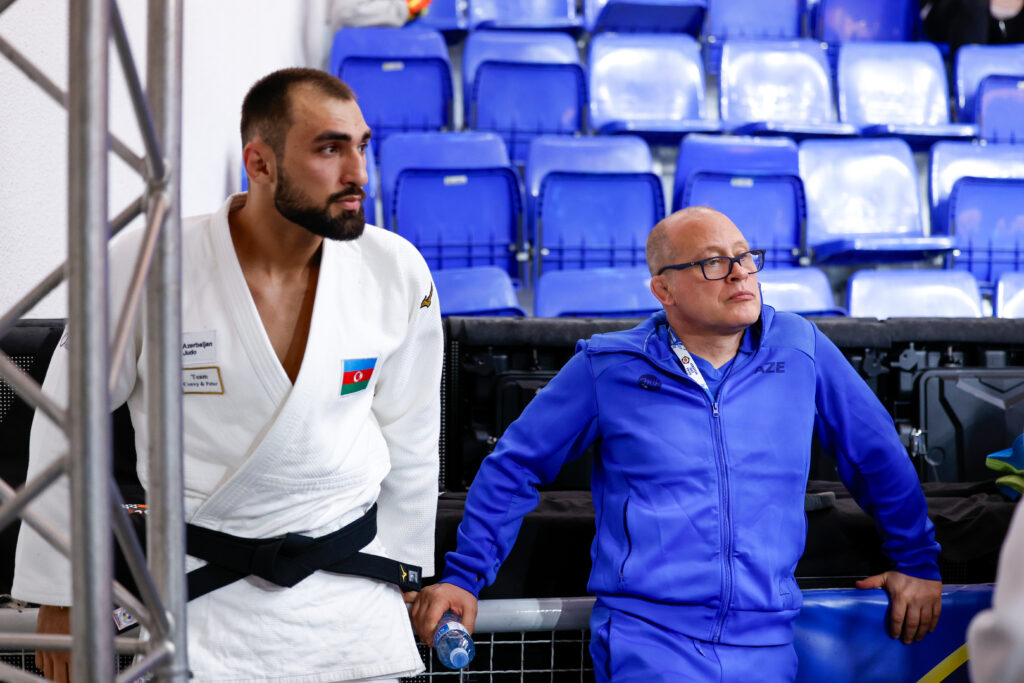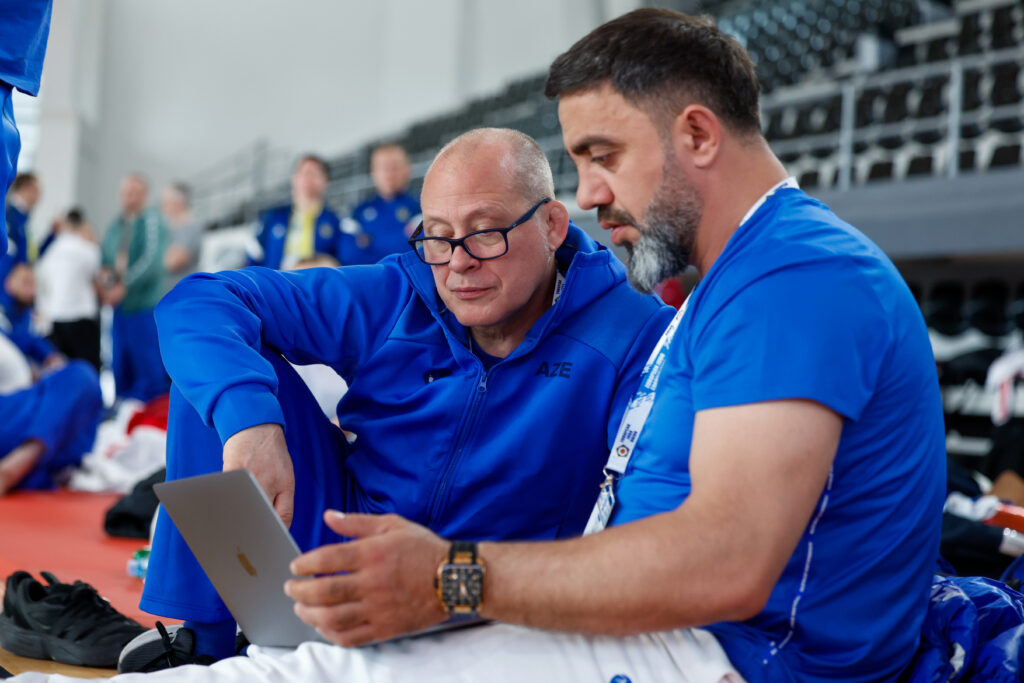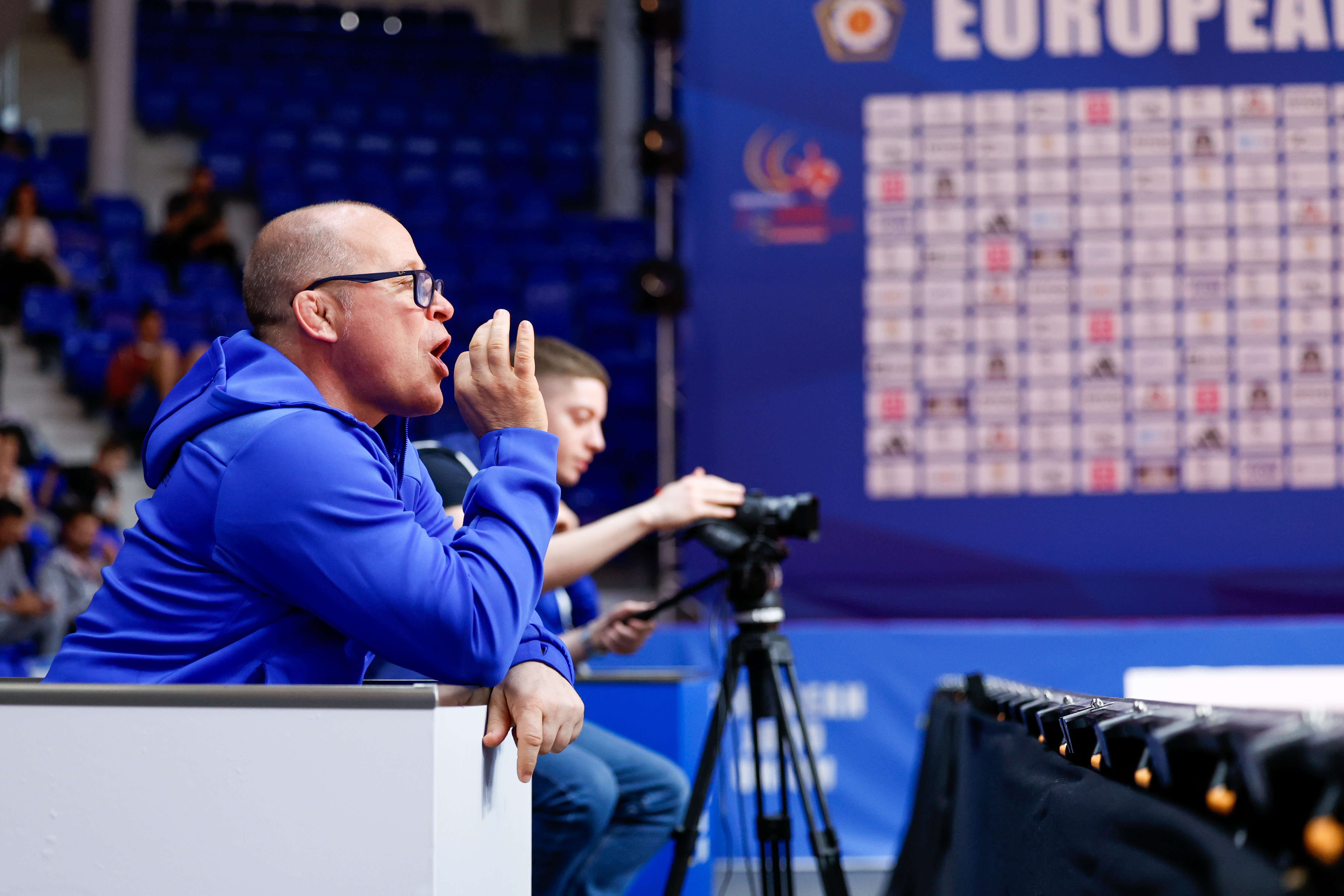Author: Tatjana Flade
Judo powerhouse Azerbaijan keeps building and head coach Richard Trautmann has set his eyes firmly on the Olympic Games 2028 and that involves the development of women’s judo in the country. Trautmann, who has been working in Azerbaijan since March 2022 and was instrumental in guiding Hidayat Heydarov and Zelim Kotsoiev to Olympic gold in Paris in 2024, just received the EJU’s Best Men’s Coach Award for 2024 in Podgorica during the European Judo Championships Seniors.
How pleased are you with the performance of your team so far in Podgorica?
Richard Trautmann: “As always, in a team not everyone can show their potential at the same time. I was a little disappointed on the first day but we got a bronze medal from an athlete that hadn’t medalled yet at this level, Ahmad Yusifov. That is definitely a progress and very good. However, two others that had potential for gold and our -66kg fighter Ruslan Pashayev had previously beaten the whole podium. But that’s judo, he made mistakes in the first round. This is what makes our sport so exciting, you cannot predict anything.
“In athletics for example you often know beforehand who is going to win but in judo you can lose as a favourite. I wouldn’t call my athlete a favorite, he’s too new in the business for that, but he had the potential to win and I can’t be happy when he loses in the first round. On the second day I was pleased. Originally our Olympic and World Champion Hidayat Heydarov was supposed to fight but he fell sick and he pulled out last minute. So we asked Rashid Mammadaliyev who was only as substitute for the team event to come three days earlier and he won a bronze medal, which is great. He is an excellent athlete but he came off an injury and was lacking training. To come third here was spectacular. On the third day, I was not so happy about the decision against Murad Fatiyev in the semi-final against the Italian Christian Parlati. I saw it differently, but I might be wrong. We also lost the semi-final in the -81kg (Zelim Tckaev vs Tato Grigalashvili, GEO). Again, I am sure it was not the right decision but I have to accept it. Sometimes it is us who win this way.”

Will Hidayat Heydarov come to the World Championships?
RT: “That’s the plan. Now he has to get healthy first and then we have to prepare in a responsible way.”
The new Olympic cycle has begun. What is your outlook?
RT: “None of our top athletes has retired but you need to think ahead. Not all of them are so young anymore and it’s still three and a half years until Los Angeles. Therefore, we are building the next generation and therefore I was happy that we had younger athletes on the podium that weren’t there before. We started to build a new team and after the Olympic Games we organised the team. There are a lot of things that you can’t take care of before the Olympics. Athletes have injuries, but they are preparing for the Games and they can’t have a surgery, these things. Someone needs to do his military service, which has to be done at some point. Our two Olympic Champions had a lot of celebrations and obligations for the federation, and needed time for themselves as well. We started again in February and obviously we are not yet at a 100 percent, but that is not a problem. We need to be at a 100 percent when the really big medals are at stake. I am hoping for a good World Championship this year but your next big goal for us as a federation are the World Championships next year that will be held in Baku, in Azerbaijan. Obviously we want to shine there and then of course it’s about the Olympic Games. It is great in our sport to become World Champion but what really gets noticed by the public are the Olympic Games. This is where you need to be present and get medals. Therefore, our long-term plans are focused on Los Angeles 2028. It is important now to bring up young people that maybe will peak in three years when the current stars maybe are past their peak. Otherwise, you suddenly might be left with empty hands.”
Azerbaijan has a long and successful history in men’s judo. What has changed in the development of women’s judo?
RT: “Basically, the situation for the women hasn’t changed that much but our goals have changed. We don’t want just to accept anymore that there is nothing happening with the women. We are working hard on that. We got two good coaches for the women, Amina Abdellatif from France and Sascha Herkenrath from Germany. We want to change the atmosphere in the team. If an athlete feels that she is only playing gooseberry, it is hard to develop the confidence you need to win. Obviously, the potential is limited as there are not many women that want to practice judo seriously at a high performance level and that are committing themselves and say ‘I want to be Olympic Champion’. There are not so many female athletes that want to do judo to begin with. The number is really limited. However, our president wants to seriously invest in the women’s judo and bring it up. There are two different things that we need to keep in mind. One side is what we can do as a federation and as coaches which is providing concepts, training plans, mental and financial support. To generate acceptance in society on the other hand is very difficult for the federation and it only works through success.
“It would be good to have a role model such as Diyora Keldiyorova from Uzbekistan, she is a smart girl, Olympic Champion, muslim, married and she says, ‘this is all possible, it is not a problem’. For us it is not that easy yet. We have a few girls that want to go into that direction but that doesn’t happen in one day. It is difficult to make someone strong if around them nobody is strong. When I look at our men, everyone has competition at the national level. That is not the case for the women. They don’t have training partners. Sometimes you are not the best but just the only one. We want to make the girls stronger so that we can have at least a mixed team for the Olympic Games 2028. It is not that easy as the girls need to qualify. A part of our plan is that our girls need to train much more than the men with other nations. Our new women’s coaches have gotten an overview in the first four months to know who is there, to get to know the personalities. Now we are getting to the next stage and will make plans for the individual athletes. We hope we’re going to do a good job with that. If we manage that one or two of our girls will get close to the top it can lead to a knock-on effect. We see that with the men. They are very successful and now many more boys want to do judo. We don’t have yet a role model for the girls and we need to create that. It is not easy but it is great that our president is so supportive. We are ready to invest a lot and to try unusual ways.”

What else is important to you?
RT: “We want to develop judo in all its aspects, as a philosophy, as a model of education. It’s not about thinking only about the next medal. We need to live the motto “judo is more than sport”. We also have a Japanese coach, Kotaro Sasaki, who makes the athletes familiar with these aspects of judo. We don’t just want good athletes that are mentally and physically educated but we want to shape people that are ready to take on responsibility in society and sport and that continue our mission.”
Author: EJU Media




